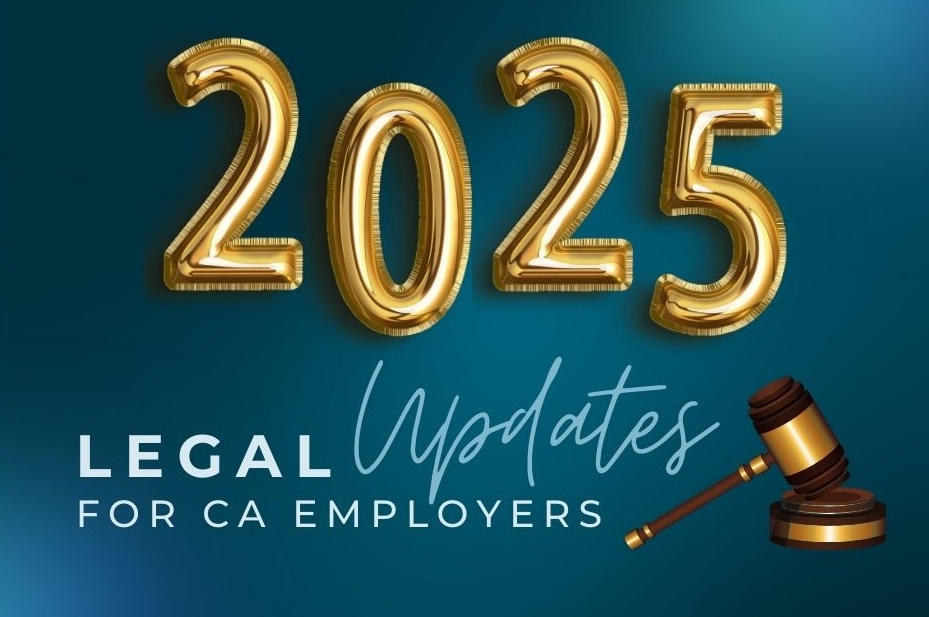
Important 2025 Legal Updates for California Employers
Key Legislative Changes Impacting Businesses
The 2024 California Legislature sent several bills to the Governor’s desk this year. While it may have seemed like it was a relatively slow year for employment legislation in California, there are some important bills for employers to take note of for 2025.
One of the most important developments was the news about a bill passed in 2024 that updated the decades-old PAGA rules. If you missed the good news for employers, you can read more about it on our Positive News About The Updated PAGA Rules Blog.
Here is a recap of some of the 2024 employment bills of particular interest to employers passed in this legislative session and signed by the Governor. These laws are effective on January 1, 2025.
Employers are no longer allowed to require someone to have a driver’s license in a job ad, posting, application, or other material unless both of the following conditions are met: 1) driving is reasonably expected to be one of the job functions for the position and 2) the employer reasonably believes that using an alternative form of transportation, such as a ride-hailing service or a taxi, bus, bicycle or walking, would not be comparable in travel time or cost to the employer.
This bill, otherwise known as the Captive Audience Ban, prohibits employers from discharging, disciplining, or otherwise penalizing or threatening to penalize an employee who refuses to attend a meeting or to read or listen to other communication from an employer about political or religious matters. In addition, if an employee does not attend a meeting about these topics, they still must be paid for the time they would have spent if they attended the meeting.
Political matters are defined as communication relating to elections for political office, political parties, legislation, regulation, and the decision to join or support any political party or political or labor organization. Religious matters are defined as matters relating to religious affiliation and practice and the decision to join or support any religious organization or association.
California law already protects victims of crimes but broadens the definition to include those who are victims of a ‘qualifying act of violence’ whether or not someone is arrested, prosecuted for, or convicted of committing any crime. An act of violence also includes an act or pattern of conduct where an individual exhibits or uses a firearm or other dangerous weapon or a reasonably perceived threat of use of force to cause physical injury or death.
This law also removes the threshold of 25 or more employees from the expanded provisions for victims and requires all employers with at least one employee to comply with the full provisions of the law. In addition, employers with 5 or more employees must allow a family member of a victim of crimes or abuse to take time off to help ensure the health, safety, or welfare of the victim. The time off is unpaid; however, victims and family members of a victim are allowed to use any vacation, sick leave or PTO to get paid for their time off.
Employers are required to provide written notice of employees’ rights under AB 2499 to new hires, to employees annually, and at any time the employer becomes newly aware that an employee or an employee’s family member is a victim.
If a contractor or freelance worker provides services for $250 or more to a company, the company is required to have a written contract with the worker and include certain information such as names, dates, list of services, and payment information. The company is required to pay the worker by the date specified in the contract or if a date is not specified, no longer than 30 days after an invoice is delivered.
Employers are no longer allowed to require an employee who is eligible for the state Paid Family Leave (PFL) program to use 2 weeks of their accrued paid time off prior to collecting payments under the PFL program.
Also related to the State Disability Insurance and Paid Family Leave wage replacement programs, a law that was passed in 2022 will go into effect on January 1, 2025. This law provides an increase in the wage replacement that the state may pay to an employee who is collecting state disability or paid family leave from 60% to 70% and from 70% to 90% for lower earners.
What do I need to do next?
It’s crucial to review your job postings and employee handbook to ensure compliance with the latest legal requirements. At SDHR Consulting, we specialize in creating compliant job descriptions, job postings, and employee handbooks for 2025.
Ensure you are taking full advantage of the new PAGA benefits by partnering with us for a comprehensive HR Audit/Gap Analysis. We also offer Leadership Training for your supervisors, equipping them with the knowledge and best practices they need to navigate legal compliance and drive success within your organization.
Author: Traci Hagan, Manager, HR Training & Compliance
Traci is an HR Consultant who has been with SDHRC for over 6 years but has over 35 years of experience in employee relations, conflict resolution benefits administration, training and development, workers’ comp, and staffing. Traci’s experiences encompass multi-organizational and cross-cultural issues which allow her to expertly charter the waters of complex problems and where she thrives by discovering and providing solutions for smoother sailing.




